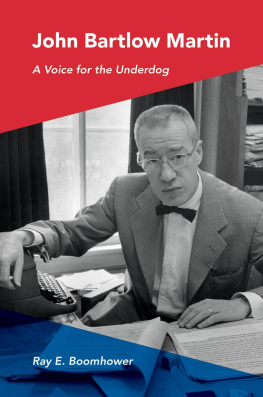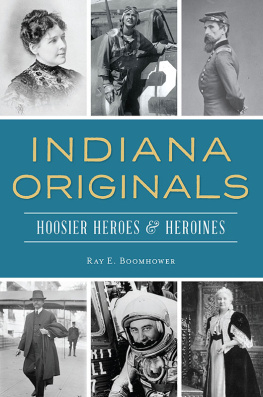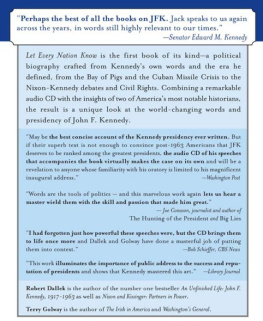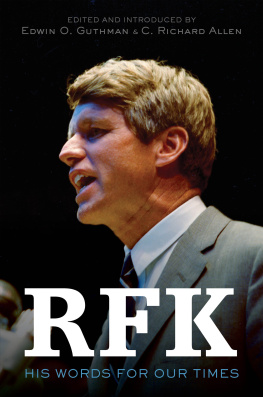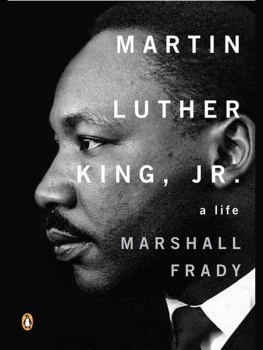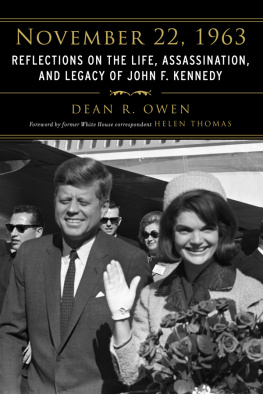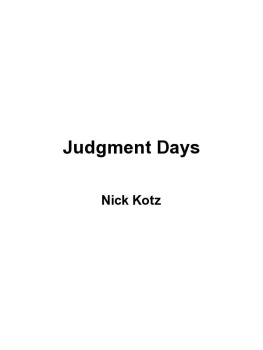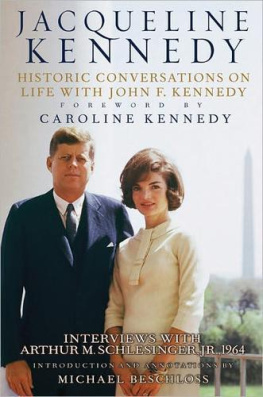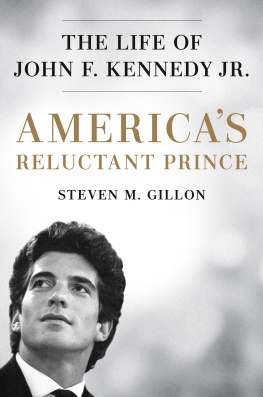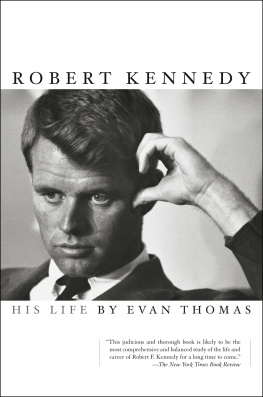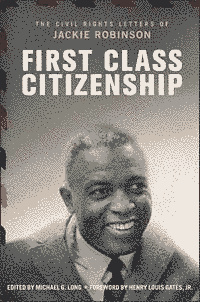This book is a publication of
INDIANA UNIVERSITY PRESS
Office of Scholarly Publishing
Herman B Wells Library 350
1320 East 10th Street
Bloomington, Indiana 47405 USA
iupress.indiana.edu
2015 by Ray E. Boomhower
All rights reserved
No part of this book may be reproduced or utilized in any form or by any means, electronic or mechanical, including photocopying and recording, or by any information storage and retrieval system, without permission in writing from the publisher. The Association of American University Presses Resolution on Permissions constitutes the only exception to this prohibition.
The paper used in this publication meets the minimum requirements of the American National Standard for Information Sciences Permanence of Paper for Printed Library Materials, ANSI Z39.481992.
Manufactured in the United States of America
Library of Congress Cataloging-in-Publication Data
Boomhower, Ray E., [date]
John Bartlow Martin : a voice for the underdog / Ray E. Boomhower.
pages cm
Includes bibliographical references and index.
ISBN 978-0-253-01614-0 (cloth : alk. paper) ISBN 978-0-253-01618-8 (ebook) 1. Martin, John Bartlow, 19151987. 2. Authors, American 20th century Biography. 3. Journalists United States Biography 4. Speechwriters United States Biography. 5. United States Politics and government 19451989.
I. Title.
PS3525.A7525Z59 2015
818'5409 dc23
[B]
2014036943
1 2 3 4 5 20 19 18 17 16 15
Dedicated to the memory of my father, Raymond Walter
Boomhower, who always believed in me. He is missed.
A professional writer cannot, like a teacher, be dull and be protected in his dullness. He must recapture his audience with every new start. He must be fascinating, bright, or pontifical, he must impress, charm, amuse, inform.
WALLACE STEGNER
The freelance writer is a man who is paid per piece or per word or perhaps.
ROBERT BENCHLEY
Preface
COLONEL ROBERT R. MCCORMICK OF THE CHICAGO TRIBUNE AND Eleanor Cissy Patterson of the Washington Times-Herald were not only cousins, but publishers that held enormous sway as isolationists warning against American involvement in World War II. In 1979 their stories were told in separate biographies, McCormick by Joseph Gies and Patterson by Ralph G. Martin. Considering the books, a reviewer in the September 30, 1979, issue of the Tribune used the opportunity to muse on the endless difficulties involved in writing a biography. Too much detail will bore the reader, too little will disappoint him. To what extent should the author act as an advocate of his subject? To what extent a critic? the reviewer asked. How is he to make his subject come alive, to breathe? How can he answer the terrible question: What made him the man he was? How much of his private life as well as his public life to include? What, aside from the laws of libel and invasion of privacy, sets limits? Taste? But whose taste? The biographers obviously; but this is a grave responsibility.
The reviewer, John Bartlow Martin, was no stranger to the field, as just a few years before he had produced the definitive two-volume biography of former Illinois governor and two-time Democratic presidential candidate Adlai E. Stevenson. To Martin, the authors of the McCormick and Patterson biographies had failed to make their subjects come alive for their readers. The works on the newspaper titans paled in comparison to writers he believed had admirably surmounted the difficulties he had posed for crafting a biography Arthur M. Schlesinger Jr. in Robert Kennedy and His Times and William Manchester in his biography of General Douglas MacArthur, American Caesar (both favorites of this author as well).
I came across Martins questions for biographers early on in my research for the biography that follows, and kept them in mind as I wrote the book, realizing the grave responsibility any biographer has in detailing the life of his subject. My introduction to Martin happened early in my career at the Indiana Historical Society, where I have worked since 1987. His classic Indiana: An Interpretation, originally published in 1947 and republished in 1992 by Indiana University Press, greatly influenced my thinking about the states past and future. As a former reporter turned historian, as Martin had been, I aspired to reach and inspire an audience as well as he had done during his heyday, and promised myself that one day I would write his biography. I took tentative steps at fulfilling this promise with an article on Martin in the spring 1997 issue of the IHSs popular history magazine Traces of Indiana and Midwestern History, and with detailing his prominent role in Robert F. Kennedys run for the Democratic presidential nomination in my book Robert F. Kennedy and the 1968 Indiana Primary, published by Indiana University Press in 2008.
It has been quite a journey. Along the way I received helpful guidance from such dedicated professionals as the staff at the Manuscripts Division of the Library of Congress in Washington, D.C.; Janet C. Olson at the Northwestern University Archives in Evanston, Illinois; Marcus Robyns and and Glenda Ward at the Central Upper Michigan Peninsula and Northern Michigan University Archives, Marquette, Michigan; and Susan L. S. Sutton at the Indiana Historical Society William Henry Smith Memorial Library in Indianapolis, Indiana. In addition, Jasminn Winters at the Library of Congress proved invaluable when it came to obtaining reproductions of images from Martins papers for use in the book.
Dan Carpenter, former columnist for the Indianapolis Star, provided helpful suggestions for improving the book both early on and late in the process. At Indiana University Press, Linda Oblack, Sarah Jacobi, and Michelle Sybert provided patience and understanding, both sorely needed whenever a book is shepherded into print.
Although not an authorized biography, this book would not have been possible without the support and encouragement of Martins three children Cindy, Dan, and Fred. They were tireless in answering questions I had about their parents lives, and they corrected errors without interfering with my interpretations of what happened. Cindy served as an indefatigable tour guide of Martins haunts in Michigans Upper Peninsula, taking me to her familys former cabin at Three Lakes and allowing me to visit the camp at Smith Lake. She also shared family photographs and made sure I saw Martins portable Remington Rand typewriter as well as the rubber stamps he had made for use in commenting on his students papers while teaching at Northwestern Universitys Medill School of Journalism.

